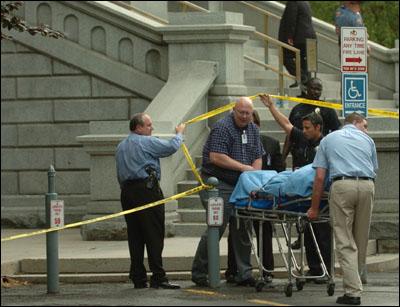Denver medical examiner receives $386,000 grant for DNA technology to help identify the dead faster
The Denver Office of the Medical Examiner has received a federal grant to buy an in-house rapid DNA processor — technology that can produce genetic-test results in a matter of hours, expediting the identification of victims in mass casualty events or helping locate family of unidentified bodies.
“This identification allows loved ones to have a burial, to obtain death certificates and to receive justice, in some cases,” said James Caruso, Denver’s chief medical examiner. “The pain for families can be unbearable when they don’t know where their loved one is and aren’t able to give a meaningful and proper goodbye.”
The coroner’s office is still researching which model of the technology to purchase with the $386,000 grant from the Federal Emergency Management Agency and the Department of Homeland Security. The office will soon solicit bids from vendors of the technology and hopes to begin using the product within a year.
Ian Harwick, the office’s decedent affairs coordinator, helped write most of the grant application after receiving a call from a Boulder detective almost two years ago who was looking into a lead in the JonBenét Ramsey case.
The detective asked whether the Denver medical examiner’s office had a database of the DNA of all of the dead who came through their office, and a lightbulb went off in Harwick’s head about how his office could better collect and store DNA.
Typically, when someone dies, the Office of the Medical Examiner conducts an autopsy and takes blood samples, which are stored in the office, Harwick said.
In the event of a mass casualty event like a fatal apartment fire, this new technology could be carried to the scene and blood samples of the dead could be inputted to identify DNA, Harwick said. Staff could begin building DNA profiles of the victims. Families of people who lived in the apartment could provide cheek swabs of their DNA, which could be matched to the victims’ DNA in a much faster way than sending samples to a third party to be tested.
“We’d be able to help that family be reunited with the remains to give them reunification and we’d be able to start moving forward with their needs,” Harwick said.
When a fatality is criminal in nature, Denver police typically assist with DNA, but Harwick said when someone dies and the circumstances aren’t criminal, it can take time to get DNA results back.
“Having the ability to process DNA on-site, in a matter of hours, greatly improves our ability to find and notify decedent’s families,” Caruso said.
Harwick is hopeful the new technology can help find next-of-kin for those examined or autopsied at the Office of the Medical Examiner. Historically, there are currently more than 230 dead people whose families the Denver medical examiner hasn’t been able to locate, dating back to 1998.
“We could use those people as a starting place, and we could build up profiles for those people and then build out family trees and hopefully give people the closure they need,” Harwick said. “A lot of these people have been homeless or estranged from their families. I think it’s important if we have the ability to reconnect them, that we should.”
In Denver, there are 17 dead people who remain unidentified right now, the medical examiner’s office said. Some have profiles listed on multiple genealogy databases hoping a relative’s DNA will match and lead to discovering their identity.
For others, the technology will allow a DNA profile to be added to databases and genetic genealogy could lead to a match and identification, the office said.
“This will further enhance how we do work here and add to the good work we already do,” Harwick said.








Gloss